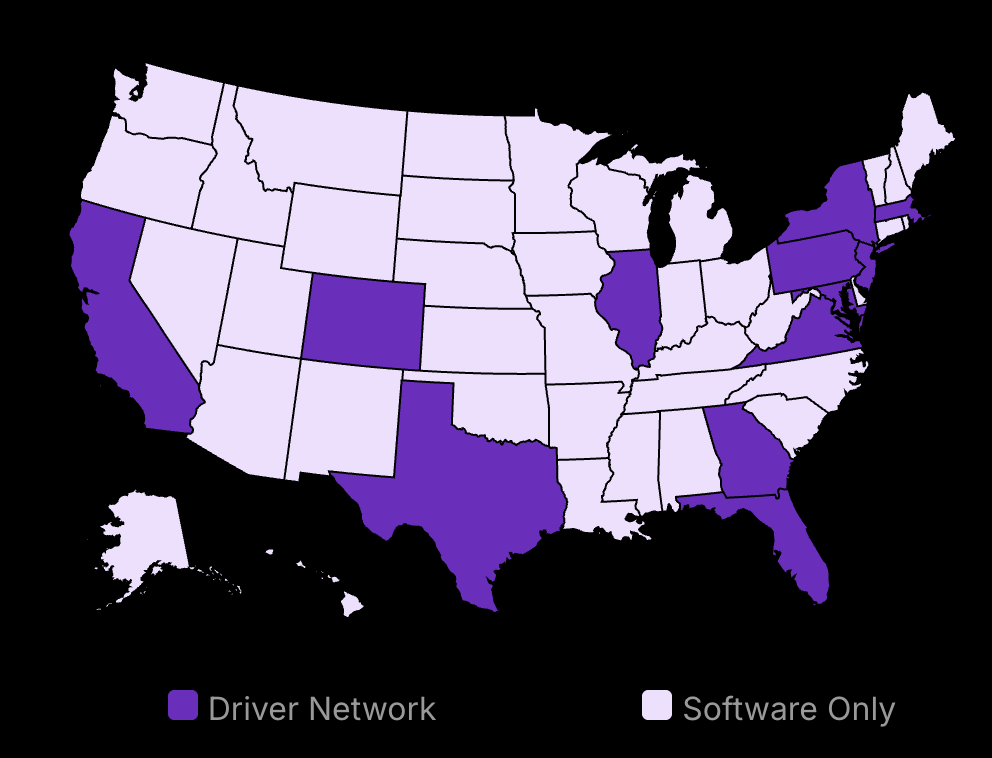Want to start affiliate marketing but don’t know where to begin?
You’re in the right place. In this comprehensive guide, we’ll walk you through the essential steps to launch your affiliate marketing business in 2025. From choosing a niche to promoting products, social media algorithms and driving traffic, we’ve got you covered.
Get ready to dive into the world of affiliate marketing and unlock a new stream of passive income.

Lower your delivery costs by 23%
How we reduce costs:
- No delivery vehicle expenses
- Optimized local routes
- Pay-per-delivery model
- Average 23% delivery cost reduction
How to Start Affiliate Marketing Business: Your Step-by-Step Blueprint for 2025
Choose a niche
Selecting the right niche is crucial for success in affiliate marketing. Start by identifying your interests, passions, and areas of expertise. This will help you create authentic, engaging content that resonates with your target audience. Research popular niches with high demand and low competition to increase your chances of success.
Market Size:
The global affiliate marketing industry is worth over $17 billion as of 2023.
Align your niche with your interests and expertise
When choosing a niche, consider topics that you are genuinely interested in and knowledgeable about. This will make it easier to create valuable content consistently and maintain your motivation in the long run. Don’t just chase trends or high-paying niches if they don’t align with your interests, as this can lead to burnout and a lack of authenticity in your content.
Research popular niches with high demand and low competition
Use keyword research tools like Google Keyword Planner, SEMrush, or Ahrefs to identify popular niches with high search volume and low competition. Look for niches with a good balance of demand and competition to increase your chances of ranking well in search engines and attracting targeted traffic.
Ensure the niche has relevant affiliate programs
Before finalizing your niche selection, research available affiliate programs to ensure there are products or services you can promote and earn commissions from. Look for reputable companies with high-quality products that align with your niche and target audience. This will make it easier to promote products authentically and build trust with your audience.
Significant Order Share:
16% of all internet orders in the U.S. are attributed to affiliate marketing.
Build a website or blog
Having a website or blog is essential for establishing your online presence and showcasing your content. Choose a domain name that reflects your niche and is easy to remember. Select a reliable web hosting provider that offers good performance, security, and customer support.
Choose a domain name and web hosting provider
When selecting a domain name, keep it short, memorable, and relevant to your niche. Avoid using hyphens, numbers, or complex words that may be difficult for users to remember or type. Research top web hosting providers and compare their plans, features, and pricing to find the best fit for your needs and budget.
Install WordPress or another user-friendly content management system
WordPress is a popular, user-friendly content management system (CMS) that is widely used for building websites and blogs. It offers a wide range of customizable themes and plugins to help you create a professional-looking site without requiring extensive technical knowledge. It also offers WordPress multisite migration, making it easy to manage multiple websites from a single dashboard and migrate them seamlessly when needed. Other user-friendly CMS options include Wix, Squarespace, and Shopify.
Design your website with a clean, professional layout
Choose a website theme that is clean, visually appealing, and easy to navigate. Ensure that your site is mobile-responsive to provide a seamless experience for users accessing your content on various devices. Use a consistent color scheme, font, and branding elements throughout your site to create a cohesive and professional look.
Create valuable content
Creating high-quality, informative content is key to attracting and retaining an engaged audience. Focus on writing blog posts, articles, and guides that address your target audience’s pain points, questions, and interests. Moreover, you can get quick help from AI tools like a paragraph writer, sentence rewriter, or content writer. These tools save time, reduce manual effort, and enhance your content publishing strategy for affiliate marketing. Simply enter your main topic or keyword and get well-written, properly structured text instantly. Optimize your content for search engines (SEO) to improve your site’s visibility and organic traffic.
Write informative, engaging blog posts related to your niche
Develop a content strategy that covers various topics within your niche. Create a mix of informational, educational, and entertaining content that provides value to your readers. Use a conversational, engaging writing style that resonates with your target audience and encourages them to interact with your content through comments and shares.
Optimize your content for search engines (SEO)
Research relevant keywords and phrases that your target audience is searching for and naturally incorporate them into your content. Use descriptive, keyword-rich titles, headings, and meta descriptions to improve your content’s visibility in search engine results pages (SERPs). Ensure that your content is well-structured, easy to read, and provides a good user experience.
Most Affiliates Rely on SEO:
78.3% of affiliate marketers use SEO as a primary traffic source.
Include relevant keywords and internal linking
In addition to incorporating relevant keywords, use internal linking to connect related posts and pages within your site. This helps search engines understand your site’s structure and can improve your site’s overall SEO. When linking internally, use descriptive anchor text that accurately reflects the content of the linked page.
Join affiliate programs
Research and join reputable affiliate programs that offer products or services relevant to your niche. Look for programs with competitive commission rates, reliable tracking, and good support for affiliates. Apply to programs that align with your content and audience to maintain authenticity and trust.
Research and join reputable affiliate programs in your niche
Use affiliate networks like Amazon Associates, ShareASale, or CJ Affiliate to find relevant programs in your niche. Read reviews and compare different programs to find the best fit for your site and audience. Look for programs with a good reputation, high-quality products, and a track record of paying affiliates on time. Discover how to enhance your earnings through affiliate marketing on Pinterest with our comprehensive guide filled with valuable insights and tactics.
Apply to programs that offer products or services your audience will find valuable
When selecting affiliate programs, prioritize those that offer products or services that genuinely solve your audience’s problems or meet their needs. This will make it easier to promote the products authentically and build trust with your readers. Avoid promoting products solely for the sake of earning commissions, as this can damage your credibility and reputation.
Familiarize yourself with the program’s terms, conditions, and commission rates
Before promoting any affiliate products, carefully review the program’s terms and conditions to ensure you understand the requirements, restrictions, and commission structures. Familiarize yourself with the program’s tracking methods, cookie durations, and payment schedules to set realistic expectations and optimize your promotional strategies.
Promote affiliate products
Once you’ve joined relevant affiliate programs, integrate their products naturally into your content. Write product reviews, comparisons, or tutorials that showcase the benefits and features of the affiliate products. Always disclose your affiliate relationships to maintain transparency and comply with legal requirements.
Integrate affiliate links naturally into your content
When promoting affiliate products, ensure that your links fit seamlessly into your content and provide value to your readers. Avoid overly promotional or salesy language, and focus on highlighting the genuine benefits and use cases of the products. Use clear, descriptive calls-to-action (CTAs) to encourage readers to click on your affiliate links.
Write product reviews, comparisons, or tutorials featuring affiliate products
Create in-depth, honest product reviews that showcase the strengths and weaknesses of the affiliate products you’re promoting. Compare similar products side-by-side to help your readers make informed decisions. Develop step-by-step tutorials or guides that demonstrate how to use the products effectively, providing real-world examples and use cases.
Disclose your affiliate relationships to maintain transparency and trust
Always disclose your affiliate relationships clearly and prominently to maintain transparency and comply with legal requirements, such as the FTC’s Endorsement Guidelines. Include a disclosure statement on your site’s sidebar, footer, or within individual blog posts to inform your readers that you may earn commissions from their purchases through your affiliate links.
Drive traffic to your website
Attracting targeted traffic to your affiliate website is essential for generating affiliate sales and growing your online presence. Promote your content on social media platforms, engage with your target audience, and build relationships with influencers and other bloggers in your niche. Utilize email marketing to nurture leads and promote your affiliate offers to your subscribers.
Affiliate Marketing: Top Revenue Channel:
20% of brand marketers say affiliate marketing is their most successful channel.
Promote your content on social media platforms
Share your blog posts, product reviews, and tutorials on relevant social media platforms like Facebook, Twitter, Instagram, and Pinterest. Use eye-catching images, compelling headlines, and hashtags to increase the visibility and reach of your content. Engage with your followers by responding to comments, questions, and messages promptly and authentically.
Engage with your target audience and build relationships
Participate in online communities, forums, and groups related to your niche to connect with potential readers and customers. Provide valuable insights, answer questions, and contribute to discussions to establish yourself as an authority in your niche. Collaborate with other bloggers, influencers, or brands to expand your reach and cross-promote each other’s content.
Utilize email marketing to nurture leads and promote affiliate offers
Build an email list of subscribers interested in your niche and content. Use lead magnets like ebooks, checklists, or templates to incentivize visitors to sign up for your email list. Create a series of automated email sequences to nurture your leads, provide value, and promote your affiliate offers. Segment your email list based on subscribers’ interests and behaviors to deliver more targeted, personalized content and offers.
By following this step-by-step guide, beginners can lay a solid foundation for their affiliate marketing journey. Remember to stay consistent, and patient, and always prioritize providing value to your audience. As you grow your skills and experience, continue to refine your strategies, adapt to changes in your niche, and explore new opportunities to expand your affiliate marketing business.
Best Affiliate Programs for Beginners
Start your affiliate marketing journey with trusted, beginner-friendly programs
Discover platforms offering a wide range of products and competitive commission rates
Learn about the key features and benefits of each program to make an informed decision
When starting out in affiliate marketing, it’s crucial to choose the right programs that cater to beginners. Joining well-established, reputable affiliate networks can provide you with a solid foundation, diverse product offerings, and reliable payment systems. Let’s explore some of the best of affiliate marketing tips and programs for beginners.
Amazon Associates
Amazon Associates is a popular choice for beginner affiliate marketers due to its vast product selection and trusted brand name. With millions of products available, you can easily find items that align with your niche and target audience. Interested in earning money by promoting Amazon products? Discover how to get started as an affiliate with Amazon Associates and tap into earning potential today.
One of the key advantages of Amazon Associates is its high conversion rates. As a well-known and trusted e-commerce platform, Amazon tends to have a higher likelihood of converting visitors into buyers. This means that even if you have a smaller audience, you can still generate significant commissions.
“I started my affiliate marketing journey with Amazon Associates, and within a few months, I was earning a steady passive income.” – John Doe, Affiliate Marketer
Top Earners Use Amazon:
Nearly half of respondents making $10,000+ per month reported using the Amazon affiliate program.
Amazon Associates offers a tiered commission structure based on product categories. While the commission rates may vary, you can earn up to 10% on certain items. This tiered structure allows you to strategize and promote products that offer higher commissions, maximizing your earnings potential.
ClickBank
ClickBank is a leading affiliate network that specializes in digital products, such as e-books, courses, and software. As a beginner, ClickBank offers a wide range of products across various niches, making it easy to find offerings that resonate with your audience.
One of the most appealing aspects of ClickBank is its high commission rates. Many products offer commissions of up to 75%, which means you can earn a significant amount per sale. This high commission structure can be particularly beneficial for beginners who are still building their audience and traffic.
ClickBank has paid out over $4 billion in commissions to its affiliates since its inception.
ClickBank provides comprehensive tracking and reporting tools, allowing you to monitor your performance and optimize your campaigns. The platform’s affiliate dashboard offers valuable insights into your click-through rates, conversion rates, and earnings, enabling you to make data-driven decisions.
ShareASale
ShareASale is a well-established affiliate network that hosts over 4,000 merchant programs across various niches. As a beginner, this vast selection of merchants allows you to find products and services that perfectly align with your audience’s interests.
One of the standout features of ShareASale is its reliable payment processing and timely payouts. The platform ensures that affiliates receive their commissions regularly, providing a stable and predictable income stream. This reliability is crucial for beginners who are looking to build a sustainable affiliate marketing business.
“ShareASale’s intuitive dashboard and detailed reporting make it easy for beginners to navigate the world of affiliate marketing.” – Jane Smith, Affiliate Marketer
ShareASale offers a robust affiliate dashboard that provides comprehensive tracking and analytics. You can easily monitor your performance, track your commissions, and gain insights into your audience’s behavior. This level of data and transparency empowers you to make informed decisions and optimize your affiliate marketing strategies.
How to Succeed in Affiliate Marketing as an Affiliate Marketer
Focus on providing value
Prioritize creating high-quality, informative content
To succeed in your affiliate marketing career, your primary focus should be on creating content that genuinely helps your audience. As Pat Flynn, the founder of Smart Passive Income, states, “Your earnings are a byproduct of how well you serve your audience.” By consistently delivering valuable information, you establish yourself as a trusted resource in your niche.
Six-Figure Income for Affiliates:
The average affiliate marketer earns $8,038 per month, which equates to a 6-figure annual income.
Build trust and credibility with your audience
Building trust is crucial for long-term success in your affiliate marketing campaigns. As Neil Patel, a renowned digital marketer, explains, “People buy from those they trust. If you want to increase your affiliate sales, focus on building trust with your audience.” Be transparent about your affiliate relationships and only promote products that you believe in and have personally used.
“People buy from those they trust. If you want to increase your affiliate sales, focus on building trust with your audience.” – Neil Patel, Renowned Digital Marketer
Recommend products that genuinely solve your audience’s problems
When selecting products to promote, prioritize those that address your audience’s pain points. As Darren Rowse, the founder of ProBlogger, advises, “Don’t just promote a product because it pays a high commission. Promote products that you believe in and that will genuinely help your readers.” By putting your audience’s needs first, you’ll naturally attract more clicks and conversions.
“Don’t just promote a product because it pays a high commission. Promote products that you believe in and that will genuinely help your readers.” – Darren Rowse, Founder of ProBlogger
Continuously learn and adapt
Stay updated on industry trends and best practices
Affiliate marketing is an ever-evolving industry, so it’s essential to stay informed about the latest trends and strategies. Attend conferences, join online communities, and follow industry leaders to stay ahead of the curve. As Charles Ngo, a successful affiliate marketer, notes, “The affiliate marketing landscape is constantly changing. What works today might not work tomorrow. The key is to always be learning and adapting.”
Analyze your performance and make data-driven decisions
Regularly monitor your affiliate marketing metrics, such as click-through rates, conversion rates, and earnings per click. Use this data to identify what’s working and what needs improvement. As Harsh Agrawal, the founder of ShoutMeLoud, suggests, “Data is your best friend in affiliate marketing. Analyze your performance, identify trends, and make informed decisions based on the numbers.”
Affiliate Conversion Challenge:
Affiliate marketers get a successful conversion rate of 0.5% to 1% per visitor on average.
Experiment with different strategies and optimize your approach
Don’t be afraid to try new tactics and experiment with different promotional methods. Test various content formats, ad placements, and call-to-actions to see what resonates best with your audience. As Zac Johnson, a seasoned affiliate marketer, advises, “Continuously test and optimize your campaigns. Even small changes can lead to significant improvements in your results.”
“Continuously test and optimize your campaigns. Even small changes can lead to significant improvements in your results.” – Zac Johnson, Seasoned Affiliate Marketer
Cultivate relationships
Network with other affiliates and industry professionals
Building relationships with other affiliates and industry experts can lead to valuable partnerships, collaborations, and learning opportunities. Attend networking events, join affiliate marketing forums, and engage with others on social media. As Missy Ward, the co-founder of Affiliate Summit, emphasizes, “Networking is key in affiliate marketing. The relationships you build can open doors to new opportunities and help you grow your business.”
Engage with your audience and respond to their feedback
Foster a strong connection with your audience by actively engaging with them through comments, emails, and social media. Respond to their questions, address their concerns, and incorporate their feedback into your content and product recommendations. As Rae Hoffman, a successful affiliate marketer, states, “Your audience is your most valuable asset. Nurture those relationships and always prioritize their needs.”
Collaborate with brands and influencers to expand your reach
Partnering with complementary brands and influencers can help expose your content to new audiences and increase your credibility. Seek out collaboration opportunities, such as co-branded campaigns, guest posts, or joint webinars. As Adam Riemer, an affiliate marketing expert, advises, “Strategic partnerships can be a game-changer in affiliate marketing. Look for brands and influencers that align with your values and target audience.”
Affiliate Programs Drive Sales:
81% of brands use affiliate programs to boost brand awareness and drive sales.
To address the question, “How do I start affiliate marketing with no money or experience?”, it’s important to note that while having a budget for tools and advertising can be helpful, it’s not essential to get started. Begin by focusing on creating high-quality content, building relationships, and leveraging free promotional marketing channels, like social media and SEO. As you grow and start generating revenue, you can reinvest in your business and scale your efforts.
A Top Revenue for Publishers:
31% of web publishers say affiliate marketing is a top revenue source.
Understanding Affiliate Marketing
Affiliate marketing is a performance-based marketing model where you earn commissions by promoting other people’s or companies’ products or services. In this model, you partner with businesses as an affiliate and receive a unique tracking link to promote their products. When someone clicks on your link and makes a purchase or completes a desired action, you earn a commission. Interested in leveraging partnership marketing for your revenue stream? Discover the essentials of affiliate marketing and see how it can elevate your earnings.
The beauty of an affiliate marketing program lies in its simplicity and low barriers to entry. Unlike starting your own business or creating your products, you can tap into existing products and leverage their marketing materials to start promoting them. This means you can focus on driving traffic and generating sales without worrying about product development, inventory management, or customer support.
Big Brands, Big Revenue:
Major brands get 5% to 25% of their overall online sales from affiliate marketing.
Types of Affiliate Programs
There are various types of affiliate programs you can join, depending on your niche and the products you want to promote. Some common types include:
1. Retailer programs: These are run by individual retailers like Amazon, Walmart, or Target. You promote their products and earn a commission on each sale. For example, Amazon Associates is one of the largest and most popular retail programs, with millions of products to promote.
2. Network programs: Affiliate networks like Commission Junction, ShareASale, or ClickBank act as intermediaries between affiliates and merchants. They provide a platform where you can find and join multiple affiliate programs in one place. Commission Junction, for instance, has over 3,000 advertisers and offers a wide range of products and services to promote.
3. Digital product programs: These programs focus on affiliate marketing spend on promoting digital products like ebooks, courses, or software. Platforms like ClickBank and JVZoo specialize in digital product affiliate programs. ClickBank, for example, has a vast marketplace of digital products across various niches.
How Does Affiliate Marketing Work?
To get started with affiliate marketing, you need to follow these basic steps:
-
Choose a niche: Select a niche that aligns with your interests and expertise. This will make it easier to create content and promote products authentically.
-
Join affiliate programs or networks: Find affiliate programs that offer products in your chosen niche. You can join individual retailer programs or sign up for affiliate networks that provide access to multiple programs.
-
Get your unique affiliate link: Once approved for a program, you’ll receive a unique affiliate link or tracking code. This link allows the merchant to track the sales or actions generated through your promotion.
-
Promote products: Create content like blog posts, YouTube videos, or social media posts that promote the products you’ve chosen. Use your affiliate link whenever you mention or recommend a product.
-
Earn commissions: When someone clicks on your affiliate site or link and makes a purchase or completes a desired action, you earn a commission. The commission rate varies depending on the program and the product.
Tracking and Payment
Affiliate programs use cookies to track the sales or actions generated through your unique affiliate link. When someone clicks on your link, a cookie is placed on their browser, attributing the sale or action to you. The cookie duration varies depending on the program, but it typically ranges from 30 to 90 days. For example, Amazon Associates uses a 24-hour cookie duration, while ShareASale offers a 30-day cookie duration.
Commissions are usually paid out monthly, either through direct bank transfers, PayPal, or other payment methods specified by the company’s affiliate program. Some programs have minimum payout thresholds, meaning you need to earn a certain amount before you can request a payout.
Benefits of Affiliate Marketing
Affiliate marketing offers several compelling benefits that make it an attractive option for entrepreneurs and marketers:
-
Low startup costs: Unlike starting your own business, affiliate marketing requires minimal upfront investment. You don’t need to create products, manage inventory, or handle customer support.
-
Flexibility: As an affiliate, you have the freedom to work from anywhere with an internet connection. You can set your schedule and work at your own pace.
-
Passive income potential: While affiliate marketing requires effort to drive your web traffic, and generate sales, it has the potential to create passive income streams. Once you have content and promotions in place, you can earn commissions even while you sleep.
-
Alignment with products you believe in Affiliate marketing allows you to choose products that align with your values and interests. By promoting products you genuinely believe in, you can build trust with your audience and create authentic content.
Scalability and Growth
One of the most significant advantages of an affiliate marketing strategy is its scalability. As you grow your audience and traffic, you can increase your earnings by promoting more products or joining additional affiliate programs. You can also expand into new niches or markets to diversify your income streams.
Moreover, affiliate marketing provides opportunities for growth and learning. As you gain experience and build relationships with merchants and other affiliates, you can access exclusive promotions, higher commission rates, or even create your products to complement your merchant’s affiliate program offerings. For example, successful affiliate marketer Pat Flynn has built a multi-million-dollar business through affiliate marketing and has shared his strategies and insights through his blog and podcast.
Further Reading and Resources
To dive deeper into affiliate marketing and continue your learning journey, here are some recommended resources:
-
“Affiliate Marketing for Dummies” by Ted Sudol and Paul Mladjenovic – This book provides a comprehensive introduction to affiliate marketing, covering topics and affiliate marketing examples like choosing a niche, joining affiliate programs, and promoting products effectively.
-
“Affiliate Marketing Secrets” by Spencer Mecham – In this book, Spencer Mecham shares his strategies and techniques for building a successful affiliate marketing business. He covers advanced topics like email marketing, paid advertising, and scaling your affiliate business.
-
Affiliate Marketing Subreddit (r/affiliatemarketing) – This subreddit is a community of affiliate marketers where you can find discussions, tips, and insights related to affiliate marketing. It’s a great place to connect with other affiliates and learn from their experiences.
-
Affiliate Summit – Affiliate Summit is one of the largest affiliate marketing conferences, bringing together affiliate marketers, merchants, and networks. Attending the conference or accessing its online resources can provide valuable insights and networking opportunities.
Remember, success in affiliate marketing requires consistent effort, learning, and adaptation. As you continue to grow your affiliate business, stay updated with industry trends, test new strategies, and focus on providing value to your audience.
Essential Tools for Affiliate Marketers
As an affiliate marketer, having the right tools in your arsenal can make a significant difference in your success. From researching profitable keywords to managing your affiliate links and nurturing your email list, several essential tools can help you optimize your efforts and increase your earnings.
Keyword research tools
Keyword research is a crucial aspect of affiliate marketing, as it helps you identify the terms and phrases your target audience is searching for. By targeting the right keywords, you can attract more relevant traffic to your website and increase your chances of making sales. Here are some of the most popular and effective keyword research tools:
Google Keyword Planner
Google Keyword Planner is a free tool provided by Google that allows you to research keywords, view search volume data, and get bid estimates for AdWords campaigns. While primarily designed for paid advertising, it’s also a valuable resource for organic keyword research.
SEMrush
SEMrush is a comprehensive digital marketing tool that offers keyword research, competitor analysis, and more. It provides detailed insights into keyword difficulty, search volume, and related keywords, making it easier to identify profitable opportunities.
According to Neil Patel, a renowned digital marketer, “SEMrush is one of the most powerful keyword research tools on the market. It gives you an in-depth look at your competitors’ keywords, backlinks, and advertising strategies, allowing you to stay ahead of the game.”
Ahrefs
Ahrefs is another popular all-in-one SEO tool that excels at keyword research. It offers a massive database of keywords, along with useful metrics like keyword difficulty, click-through rates, and search volume. Ahrefs also provides valuable insights into your competitors’ top-performing content and backlinks.
As stated by Tim Soulo, CMO at Ahrefs, “Our goal with Keywords Explorer is to give you the most accurate and actionable keyword data possible. We process a huge amount of clickstream data to calculate our keyword metrics, which allows us to provide a realistic view of search behavior and make your search engine optimization and keyword research more efficient.”
Link tracking and management
As an affiliate marketer, keeping track of your affiliate links and monitoring their performance is essential for optimizing your campaigns. Link tracking and management tools simplify this process by providing click tracking, link cloaking, and detailed reporting. Here are some of the best options:
Pretty Links
Pretty Links is a popular WordPress plugin that allows you to create clean, branded links for your affiliate promotions. It offers click tracking, link cloaking, and automatic 301 redirects, making it easy to manage and monitor your affiliate links directly from your WordPress dashboard.
Thirsty Affiliates
Thirsty Affiliates is another powerful WordPress plugin designed specifically for affiliate link management. It provides link cloaking, click tracking, and detailed reporting, as well as advanced features like automatic keyword linking and geo-targeting.
According to Adam Connell, founder of Blogging Wizard, “Thirsty Affiliates is my go-to plugin for managing affiliate links on WordPress. It’s packed with features that make it easy to keep your links organized, track their performance, and maximize your earnings.”
Redirection
Redirection is a simple yet effective WordPress plugin that allows you to manage 301 redirects and keep track of 404 errors on your website. While not specifically designed for affiliate marketing, it can be a useful tool for managing your affiliate links and ensuring a smooth user experience.
Email marketing software
Email marketing is a powerful way to nurture your audience, promote your affiliate offers, and build long-term relationships with your subscribers. To effectively manage your email campaigns, you’ll need a reliable email marketing software. Here are some of the best options:
Mailchimp
Mailchimp is one of the most popular email marketing platforms, offering a user-friendly interface, a wide range of templates, and powerful automation features. It also provides detailed reporting and integrations with various e-commerce platforms, making it a great choice for affiliate marketers.
As stated by Pat Flynn, founder of Smart Passive Income, “I’ve been using Mailchimp for years, and it’s been an essential tool for growing my affiliate income. The ability to segment my list and create targeted campaigns has been a game-changer.”
ConvertKit
ConvertKit is an email marketing platform designed specifically for bloggers and content creators. It offers a simple, intuitive interface, powerful automation capabilities, and features like landing pages and opt-in forms. ConvertKit is particularly well-suited for affiliate marketers who focus on content marketing and building relationships with their audience.
According to Nathan Barry, founder of ConvertKit, “We built ConvertKit to help bloggers and creators earn a living online. Our goal is to provide the tools and features you need to grow your email list, nurture your subscribers, and promote your affiliate offers effectively.”
ActiveCampaign
ActiveCampaign is a comprehensive email marketing and automation platform that offers advanced features like site tracking, event tracking, and dynamic content. It’s a powerful tool for affiliate marketers who want to create highly personalized campaigns and automate their email marketing efforts.
By utilizing these essential tools for keyword research, link tracking and management, and email marketing, you’ll be well-equipped to launch and grow your affiliate marketing business. Remember to continually test and optimize your digital marketing strategies to ensure you’re making the most of these powerful tools and maximizing your earnings potential. For more information on how to enhance your strategies and increase your revenue stream, explore our pivotal tips on affiliate marketing.
Your Roadmap to Affiliate Marketing Success
Affiliate marketing offers a low-risk, high-reward opportunity to earn passive income by promoting products you believe in. By choosing a niche that aligns with your interests, creating valuable content, and joining reputable affiliate programs, you can build a thriving online business. Discover the benefits of premium affiliate marketing and how promoting high-value products can significantly increase your earnings.
Efficient logistics and delivery management can dramatically improve your affiliate business operations. Implementing advanced route optimization strategies helps reduce delivery times, lower transportation costs, and enhance customer satisfaction—all critical factors for e-commerce affiliate marketers looking to maximize profits and streamline order fulfillment.
To succeed, focus on providing genuine value to your audience, continuously learning and adapting to industry trends, and cultivating relationships with other professionals in your niche.
Armed with the right tools and strategies, you’re well on your way to becoming a successful affiliate marketer. Start by implementing the step-by-step blueprint for affiliate marketing works outlined in this article, and remember to prioritize quality, transparency, and authenticity in all your efforts. One helpful resource to maximize your affiliate marketing efficiency is utilizing a reliable routing tool. A well-designed route planner tool can streamline your delivery or service routes, saving time and reducing costs while enhancing customer satisfaction. This is especially beneficial if your affiliate marketing involves logistics or physical product delivery, ensuring prompt and organized operations.
Which affiliate program or affiliate marketing niche excites you the most? Share your thoughts in the comments below, and let’s discuss how you can kickstart your affiliate marketing journey today! For those interested in expanding beyond affiliate marketing, integrating tools like delivery management software can streamline operations and improve customer satisfaction. Leveraging such technology helps businesses optimize their logistics and provide timely services. Explore how modern delivery management tools can enhance your business efficiency delivery management solutions for an edge in competitive markets.






























